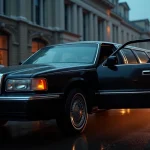Overview of British Cinema History
British cinema history is a fascinating journey of film evolution. From the early 1900s, British filmmakers have continuously made significant contributions to the global cinema landscape. One notable aspect is how British films have often set benchmarks for innovation and storytelling.
In the first half of the 20th century, the industry witnessed several cinematic milestones. This includes pioneering special effects and engaging narratives that have influenced international filmmakers. British films such as Alfred Hitchcock’s early suspense thrillers laid the groundwork for modern thriller genres.
Have you seen this : Unlock the Magic of Blacksmithing in the Captivating Scottish Highlands: The Definitive Guide to an Unforgettable Adventure!
Another pivotal era in British cinema history occurred during the 1940s and 50s with films like “The Third Man” receiving critical acclaim. These productions highlighted Britain’s knack for producing thoughtful, suspenseful dramas.
British cinema also garnered attention with award-winning films like “Lawrence of Arabia” and “Chariots of Fire.” These films not only captivated audiences worldwide but also celebrated rich storytelling and technical craftsmanship.
In parallel : Elevate your journey with premium chauffeur service 24/7
Furthermore, the influence of British filmmakers continues today. They consistently push boundaries in storytelling and technical prowess, ensuring that British cinema remains a cornerstone of global film culture.
Notable British Film Studios
The rich history of British film studios is integral to cinema’s global narrative. Iconic studios like Pinewood and Elstree have become synonymous with cinematic excellence. Pinewood Studios, established in 1936, is renowned for hosting numerous high-profile productions, including the James Bond series. Elstree Studios, with its deep roots dating back to the early 20th century, has been pivotal in producing both British and international films.
These studios have not only shaped British cinema but have also influenced film production globally. Pinewood’s state-of-the-art facilities have attracted filmmakers worldwide, while Elstree’s stages have housed legendary films, leaving indelible marks on the industry.
Today, these filmmaking locations continue to thrive, embracing modern technologies to support contemporary film production. They offer dynamic environments for diverse productions, ensuring that British film studios remain at the forefront of cinematic innovation. The legacy of these studios lies in their enduring contributions, positioning them as pillars of British cinema history and influential players on the global stage. By continuously evolving, they maintain their status as vital centres for creativity and storytelling.
Engaging Guided Tours Available
Embarking on a guided tour of British film studios offers a unique way to experience the rich tapestry of cinema. Visitors can explore behind-the-scenes action and witness the magic that brings films to life. Guided tours are designed to provide an insightful glimpse into the world of filmmaking, offering participants memorable cinematic experiences.
Overview of Guided Tour Options
Guided tours vary in offerings, with each studio providing distinct experiences. Whether it’s a trip through legendary sets or an interactive exhibit showcasing props and costumes, these tours cater to various interests. Participants might also enjoy demo workshops where they can experience aspects of film production firsthand.
Popular Tour Sites in British Cinema
Studios such as Pinewood and Elstree host fascinating tours, attracting film enthusiasts. Notable sites allow visitors to explore iconic filming locations, providing an intimate look at where famous scenes were crafted. These tours reflect the studios’ storied histories and contemporary relevance.
Special Features of Tours
These tours often include engaging features like actor interactions or storytelling sessions by knowledgeable guides. With various durations and frequencies to accommodate different schedules, guided tours also provide exclusive access to areas typically restricted to the public.
Practical Information for Planning Tours
Planning a visit to British film studios involves essential logistics. Tour planning begins with understanding ticket prices and booking processes. Many studios offer online booking options, allowing visitors to secure their spots in advance. Prices vary, often depending on the package and included features. Some tours might offer discounts for group bookings, providing cost-effective opportunities for families or large parties.
For an enriching cinematic experience, consider visiting during quieter times. Weekdays tend to be less crowded, offering more intimate access to studio tours. Checking the studio’s calendar for events can ensure a seamless visit without overlaps with major filming schedules.
Accommodation near the studios can enhance convenience. Options range from luxury hotels to budget-friendly stays, catering to diverse preferences. Transport options abound, with rail and bus services connecting studios to surrounding areas. Planning ahead ensures exploration of not just the studio, but also its vibrant locale.
Visitors should check visiting guidelines, ensuring adherence to safety protocols and respecting restricted areas. This preparation ensures an engaging and memorable tour, offering deep insights into the magic of British cinema.
Visual and Historical Context of British Cinema
British cinema is rich in film visuals and historical documents, providing a fascinating insight into cultural transformations. Visual elements are crucial in understanding film history, as they capture the essence of different eras. Iconic films not only tell stories but also reflect the societal mood through their visuals, from the grandeur of period dramas to the gritty realism of social commentaries.
Archival footage and photographs offer a window into the past, showcasing the evolution and artistic flair of British filmmakers. These archives help us appreciate the technical advancements in cinematography and the cultural imprints made by landmark films. They feature everything from detailed costume designs to innovative set creations, providing a holistic view of the filmmaking journey.
The cultural impact of British cinema extends beyond entertainment, offering commentary on societal changes. Films often mirror the social landscape, depicting struggles, triumphs, and everyday life. This cinematic reflection allows audiences to connect with history, experiencing the world as it was and shaping perceptions of the present. Such context enriches our appreciation of how cinema as an art form can influence and reflect cultural narratives globally.



